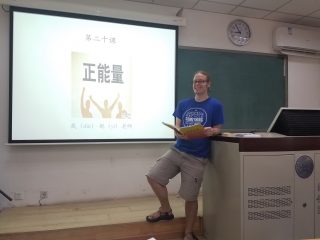 Global comm
Global comm unication has never been as important as it is today, and it is the responsibility of the modern student to take on the challenge of bringing cultures together in such trying times. During the summer of 2017, Zachary Tipton, a Senior in Environmental, Soil & Water Science went to Beijing Normal University in collaboration with Princeton University to participate in a highly-competitive, intensive language course for Mandarin Chinese.
unication has never been as important as it is today, and it is the responsibility of the modern student to take on the challenge of bringing cultures together in such trying times. During the summer of 2017, Zachary Tipton, a Senior in Environmental, Soil & Water Science went to Beijing Normal University in collaboration with Princeton University to participate in a highly-competitive, intensive language course for Mandarin Chinese.
The Princeton in Beijing program is an eight-week program where students are only allowed to communicate in Mandarin. Students were even asked while talking to friends and family back home, to remove themselves to a location where no other student will overhear them. The beauty of the program lies in its rigorous demands. By forcing students to immerse themselves 100% into the language, their skill levels advance by leaps and bounds. When asked how he handled it, Zachary responded by saying, “it was a little terrifying at first, but I had already been traveling around China for a month before the language program, so I felt that put me at a little bit of an advantage in the beginning”.
The day started right at 8 a.m. with four hours of class. The first two hours were with one professor, then a second came in for the latter half as a method of getting students exposed to accents and teaching styles from all over China. Likewise, the professors had a chance to be exposed to students attending colleges all over the United States. Sometimes during class, students would be assigned to argue for or against a major issue relevant to today’s society.
“It was really great to be around so many different types of people working incredibly hard for the same goal. There were students from top universities out of every state. Not only did I learn about Chinese culture, I got to learn more about American culture too, and what other people’s opinions were regarding major issues. Sometimes these debates would get a little heated, but at the end of the day all of the students would congratulate each other for the hard work,” says Zachary.
Another part of the program is 1-on-1 tutoring for an hour every day.
“This was by far my favorite part of the program, where I really got to speak my mind. The teachers, many of whom have not had the chance to visit the U.S., were incredibly interested to hear about what’s going on, especially with hot topics like Trump, gun control, police violence, and the American education system.”
Besides studying, studying, and more studying, weekend trips were planned to take students to some of the most famous places in Beijing.
“We went hiking outside of Beijing, to the Summer Palace, and a short part of the Great Wall among other places. One weekend we traveled to the Marco Polo Bridge just South-West of Beijing. This was a powerful moment, as the Marco Polo Bridge is where Japanese and Chinese troops first exchanged fire in 1937, starting a conflict that would ravage China for the next eight years.”
“When I returned my friends and family asked ‘how was China?’ I still have not figured out a concise response to this question. China is a beautiful country with beautiful people dealing with complex issues as the government invests every resource it has to modernization.”
When asked for tips regarding language acquisition, Zachary responded, “the most important thing when learning a new language is you cannot be shy. Get out there and talk with people! People know you are struggling and will do anything to help, they’ll probably laugh at you a bit, but it’s a good laugh! Oh, and food vocabulary quickly becomes the most important!”



